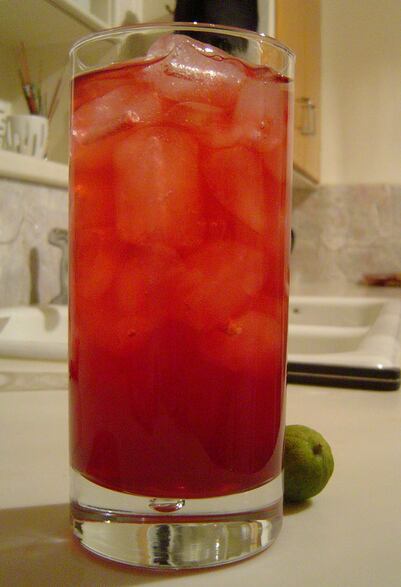Writing in an article published today in The Lancet Diabetes & Endocrinology, authors Jason Gill and Naveed Sattar link sugar-sweetened beverages to obesity (Malik et al. 2013) and argue that fruit juices are just as bad as commonly identified liquid culprits in terms of their impact upon obesity and diabetes.
Introducing their comment, Gill and Sattar say there is no evidence that SSBs are more harmful than other sources in terms of calorific intake but warn that their satiating effect is less than solid foods.
Non-alcoholic beverages contribute around a quarter of UK sugar intake and offer few nutritional benefits, so reducing intake levels represents “low hanging fruit” in terms of public health, they add.
‘Virtuous’ UK image, but is it deserved?
And despite fruit juice’s “virtuous” UK image, the researchers warn it has a similar energy density and sugar content to SSBs: 250ml of pure apple juice has 110kcal and 26g sugar, 250ml of cola: 105kcal, 26.5g.
An online poll underpins the comment, and Gill and Sattar surveyed a nationally representative group of 2,005 adults living across the UK between March 30 and April 1 2012 to assess knowledge of sugar content of sugar-sweetened beverages (SSBs), fruit juices and smoothies.
Participants were shown pictures of different non-alcoholic drinks (all with similar sugar levels) and asked to estimate the number of teaspoons of sugar contained in each portion.
Gill and Sattar found that the sugar content of fruit juices and smoothies – including orange juice, apple juice, pomegranate juice – was underestimated by 48% on average.
The most shocking discrepancy involved pomegranate juice, where respondents estimated around 2g of sugar/100ml on average when the real level was circa. 13g (550% more).

Energy drinks unfairly maligned
By contrast, energy drinks were unjustly judged – estimates of circa. 18g/100ml were far in excess of circa 11g/100ml, the real average level.
It is implicit in current UK nutritional guidance to limit fruit juice intake, with only the first 150ml consumed counting towards the five-a-day fruit and vegetable intake target.
But Gill and Sattar said the inclusion of any fruit juice as a fruit equivalent is “probably counterproductive” since it fuels the perception that drinking fruit juice is good for health and thus need not be subject to limits people impose for other less healthy foods.
“We suggest that, like SSBs, fruit juices are sugary drinks with a probable net adverse effect on health,” Gill and Sattar argue, urging better labelling to include maximum daily intake recommendations.
“A fruit juice tax is probably not warranted: however, in the broader context of public health policy, it is important that debate about SSB reduction should include fruit juice,” they add.
Researcher: 'We're being provocative but our point is real'
Speaking to BeverageDaily.com, comment co-author Professor Naveed Sattar, from the Institute of Cardiovascular and Medical Sciences at the University of Glasgow, said he was not surprised by the polling results.
"I think there is a big misconception out there fueled in part by drink industry - natural sugar vs added sugar in fruit etc…..when in fact one gram of sugar whether added or from fruit gives same calorie content," Sattar said. "The connotations about fruit being healthy are emphasized in fruit juice advertising and on the labels so that folk tend not to look at sugar content and even if they do, they assume must be better for them than added sugar content.
"So there are lots of misunderstanding or myths that we need to address," he added.
"We were being provocative but the point we make is a real one – drinking lots of fruit juice on assumption that more is good for you is simply not correct. As a nation we need to encourage more folk, of all ages, to eat fruit in the way nature designed it. That way, we chew it, get the full fiber hit, and also take in less calories per gram of weight compared to fruit juice."
BSDA fights fruit juice corner
Responding to The Lancet study, Gavin Partington, British Soft Drinks Association (BSDA) director general, said in a statement sent to BeverageDaily.com: “The majority of adults and children in the UK do not meet the minimum recommendation of 5 portions of fruit and vegetables a day.
"Fruit juice does contain naturally occurring sugar, but also provides essential vitamins and nutrients which is why Government has recommended that it can count as one of your 5 a day. It’s worth remembering that fruit juice accounts for just 1% of the calories in the average British diet but like all food and drink it should be consumed as part of a balanced diet and active lifestyle," he added.
The BSDA 2013 annual report states that fruit juice accounted for 8% of UK soft drinks sales by volume in 2012 (Zenith International). It is drunk in 85% of households (Kantar Worldpanel) but consumption in the sector fell 4.9% to 1.105bn liters, with a 1.5% value increase to £1.86bn primarily ascribed to price inflation.
*Article updated 11/2/14 to include research comment.
Title: ‘Fruit Juice: Just Another Sugary Drink?’
Authors: Gill, J.M.R, Sattar, N.
Source: The Lancet Diabetes & Endocrinology, published online February 10 2014, http://dx.doi.org/10.1016/S2213-8587(14)70013-0
